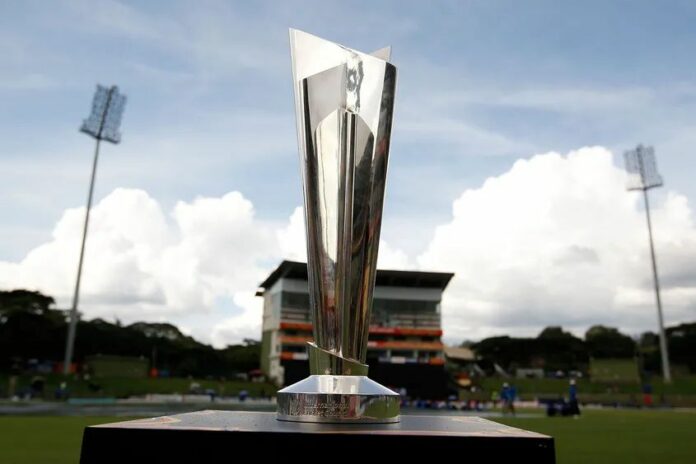Five long years we have had to wait but the ICC Men’s T20 World Cup returns on Sunday with 16 teams looking to emulate the West Indies who lifted the trophy in 2016.
- This is one of many articles now available on the Online Media Zone for free editorial use; for access to the OMZ, send in your name, designation, organisation and e-mail ID to [email protected]
- The photographs of the ICC Men’s T20 World Cup 2021 trophy at the Louvre Abu Dhabi ahead of the tournament that begins on Sunday 17 October in UAE and Oman is available to download on the Online Media Zone
Five long years we have had to wait but the ICC Men’s T20 World Cup returns on Sunday with 16 teams looking to emulate the West Indies who lifted the trophy in 2016.
It all begins with the first round in which eight teams are split into two pools, from whom the top two will qualify for the Super 12 where they will join the world’s top eight sides.
Among the first-round sides are Sri Lanka, who have played and won more matches in ICC Men’s T20 World Cup history than any other team, and Bangladesh, the other ever-present among the eight.
Bangladesh will be in action on the opening day against Scotland, but it all kicks off with hosts Oman taking on debutants Papua New Guinea to the Al Amerat Cricket Stadium.
Those four sides are in Group B, while in Group A, Ireland and Netherlands face off in a potentially crucial match on Monday, with Sri Lanka going up against Namibia later in the day.
With 12 games across the first six days, the action will come thick and fast to decide which teams will make it through to the Super 12 where Group 1 looks a blockbuster with defending champions the West Indies, reigning one-day world champions England, and heavyweights Australia and South Africa.
They will be joined by the winners of Group A and the runners-up in Group B.
Meanwhile, in Group 2, inaugural winners India are joined by great rivals Pakistan – who they will face in their opening game – as well as New Zealand and Afghanistan, the emerging force in T20 cricket, plus the winners of Group B and runners-up from Group A.
The Super 12 action kicks off on October 23 with Australia against South Africa, one of the sport’s iconic rivalries, followed by a day/night affair at the Dubai International Cricket Stadium between England and the West Indies – a repeat of the 2016 final when Carlos Brathwaite announced himself to the world.
Brathwaite returns as part of an experienced Windies side which includes three players who featured in the first T20 World Cup – the Universe Boss Chris Gayle, as well as all-rounder Dwayne Bravo and fast bowler Ravi Rampaul.
They are three of the seven players who return having also appeared in the first edition. The other four are Bangladesh duo Shakib Al Hasan and Mushfiqur Rahim, Pakistan all-rounder Mohammad Hafeez and India opener Rohit Sharma.
Those players could all have a big influence on the final outcome, but as Brathwaite showed in 2016 with his 34 off 10 deliveries, newcomers can also become the heroes.
With that in mind, could one of Babar Azam, Rishabh Pant, Lockie Ferguson or Tabraiz Shamsi be the player to swing a crucial game this time around?
Shamsi, the number one ranked bowler in the MRF Tyres ICC Men’s T20I Player Rankings, could be particularly influential on the turning wickets in the UAE and Oman as he tries to help South Africa reach the semi-finals for the third time.
T20 cricket is all about speed, and the Super 12 will also go by in a flash with 30 matches in just 17 days.
By November 10, we will be down to just four teams, with the Sheikh Zayed Cricket Stadium in Abu Dhabi playing host to the first semi-final, while the Dubai International Cricket Stadium hosts the second as well as the final on November 14.
Over the previous six editions of the tournament, a trio of sides have made it to the semi-finals on four occasions. Pakistan did so in the first four editions, while Sri Lanka did it four times running between 2009 and 2014. The other side to have managed it are the West Indies, the only team to have won the tournament more than once.
Australia have the best record of any team not to have won the competition, with three semi-final appearances and one runners-up finish in 2010, beaten by England in the final.
Under the leadership of Aaron Finch, could this be the tournament where they break their duck? Or maybe Afghanistan will continue a remarkable rise, spearheaded by the world’s number one all-rounder Mohammad Nabi and the ICC Men’s T20I Player of the Decade Rashid Khan.
At this stage it is impossible to tell, so make sure to follow every moment of what should be a thrilling World Cup.

















